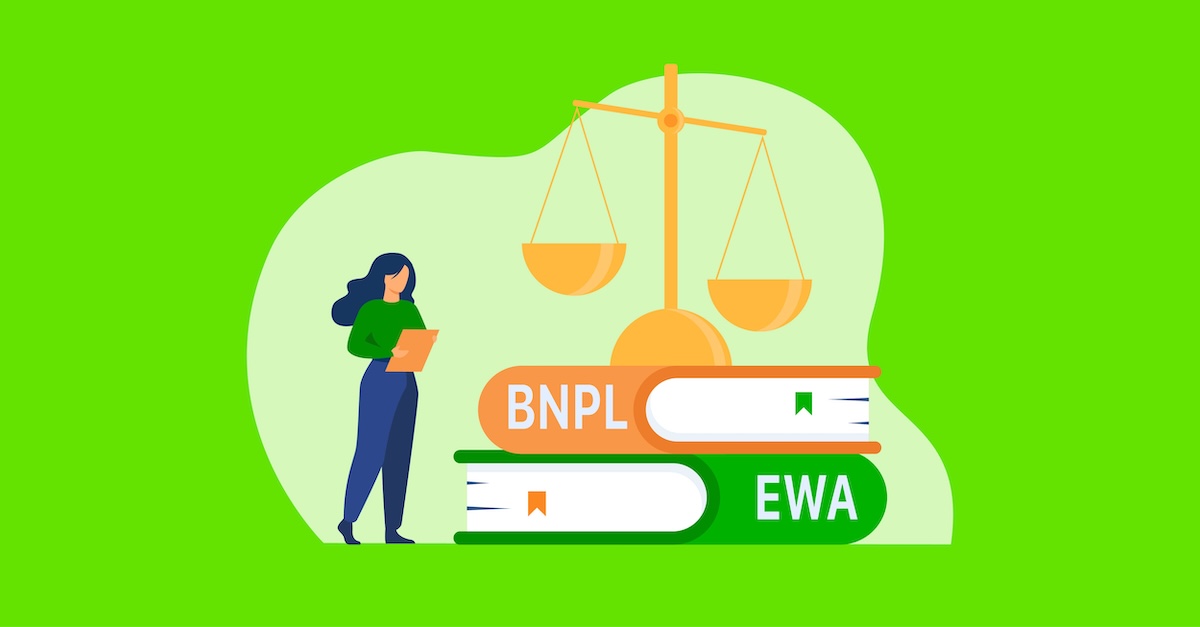Episode 51: Expert Insights on Regulatory Shifts in EWA and BNPL

This COMPLY Podcast episode is part 1 of a conversation between Eric Goldberg, Partner at Akerman LLP, Catherine Brennan, Partner at Hudson Cook LLP, and Rhonda McGill, PerformLine’s Senior Director of Customer Marketing as they discuss the impact of recent regulatory activities on marketing compliance.
They discuss:
- How recent CFPB rulings are redefining Earned Wage Access (EWA) and Buy Now, Pay Later (BNPL) products
- The specific challenges EWA and BNPL providers face in adapting to new regulations, such as the need for revised disclosure practices and handling consumer disputes
- Potential long-term impacts of these regulatory changes
Show Notes:
- Impact of Recent Regulatory Updates: EWA, BNPL, Chevron Doctrine: https://performline.com/blog-post/impact-of-recent-regulatory-updates-ewa-bnpl-chevron-doctrine/
- Access PerformLine’s free Marketing Compliance Resource Library: https://performline.com/resources/
- Connect with Rhonda: https://www.linkedin.com/in/rhonda-mcgill/
- Connect with Eric: https://www.linkedin.com/in/ericigoldberg/
- Connect with Cathy: https://www.linkedin.com/in/cathybrennan/
- Connect with Gianna: https://www.linkedin.com/in/gianna-kennedy/
Subscribe to COMPLY: The Marketing Compliance Podcast
About COMPLY: The Marketing Compliance Podcast
The state of marketing compliance and regulation is evolving faster than ever, especially for those in the consumer finance space. On the COMPLY Podcast, we sit down with the biggest names in marketing, compliance, regulations, and innovation as they share their playbooks to help you take your compliance practice to the next level.
Episode Transcript:
Gianna:
Hey there COMPLY Podcast listeners and welcome to this week’s episode. This week’s episode is part one of a conversation between Eric Goldberg, Partner at Akerman, Catherine Brennan, Partner at Hudson Cook, and Rhonda McGill, PerformLine’s Senior Director of Customer Marketing as they discuss the impact of recent regulatory activities on marketing compliance.
Rhonda:
Hello, and thank you so much for joining us for today’s webinar on the impact of recent regulatory activities on marketing compliance. My name is Rhonda , and I’m always happy to moderate these panels here at PerformLine, because they bring together really great legal minds who are willing to break down the latest developments that are of interest to you.
I’m happy to have with me today my special guests, Eric Goldberg and Cathy Brennan, both of whom I’ve had the pleasure of meeting at one or more of our Comply conferences back when we did those in person. I sure miss those days, but it was always fun to get together with folks and network. So, I want to turn it over to each of you to share a little bit about yourself and your background with our audience. I’ll say, who wants to go first?
Eric:
I’ll go first. Thank you for having me. It’s really great to be here, and I appreciate the ability to participate. I’m Eric Goldberg. I’m a partner at Akerman. I’m based in our Washington, D.C., office and in our Consumer Financial Services, Data, and Technology Practice Group. I work with fintechs, non-banks, and banks of different sizes on regulatory compliance and regulatory engagement issues, such as enforcement and supervision matters. Before coming to Akerman, I spent almost seven years at the CFPB, where I was Managing Counsel responsible for the agency’s payment regulations. Thanks again for having me.
Rhonda:
Thank you, Eric. And Cathy, we’ll turn it to you.
Cathy:
Thank you. It’s great to be here. My name is Cathy Brennan. I’m a partner with Hudson Cook. We are focused exclusively on regulatory compliance on both the consumer and commercial sides. My practice really consists of advising mostly investors that are looking at fintech opportunities across all asset classes, and certainly the ones we’re going to talk about today are some of the more interesting ones that are out there now.
Rhonda:
Wonderful, wonderful. Thank you both again for being here with us. Just to get us started, we’re going to talk a little bit about a few different topics that have come up of interest—specifically earned wage access, the buy now, pay later regulation, and the most recent decisions around the Chevron Doctrine being overturned and statute of limitation rulings. Hopefully, we’ll have a really good conversation about those topics. So I guess we’ll start with the earned wage access. This is one of those topics that I think a lot of folks understand, but then there are some missing pieces. There’s always like, okay, is there? There’s the disclosure issue, there’s these fees, there are all of these different things. So could one of you just give our audience a brief overview of exactly what earned wage access is in your words? Eric, would you like to start?
Eric:
Sure, happy to kick it off. Earned wage access can cover a range of different programs. But, generally speaking, it’s a program provided by someone independent of the consumer’s employer that provides early access to earned wages. So, there are two primary flavors of that. One is where the third-party provider partners with the employer, has access to payroll data, and gives early access to a portion of wages before payday. Then, those wages are typically deducted from the paycheck on payday. The other flavor is where there’s no connection between the provider and the employer, and the provider uses some means of assessing whether the consumer has worked, providing early access to their wages. A key hallmark of both of these, and we’ll probably get into this to some degree, is that these are considered and have been marketed in terms that say these products are non-recourse, which, unlike a loan, means that the provider has no ability to collect from the consumer if the repayment doesn’t work as intended. So the payroll deduction doesn’t work, or in the direct-to-consumer model, the ACH or other means of repayment doesn’t work. The last thing I’ll say is the fees for these products are typically different from loans. Most of them have some form of free method of obtaining the earned wage access, and then there’s either a means where you can pay a fee to get expedited receipt of those funds—so if you want funds today you can pay a fee, if you want funds in two days that’ll be free—or other programs allow you the option of paying a tip to the provider, an optional gratuity, but those tips aren’t required.
Rhonda:
Yeah, that sums it up. So I know the CFPB recently proposed an interpretive rule, explaining that many paycheck advance products, also known as earned wage products, are consumer loans subject to the Truth in Lending Act. So, Cathy, what are the key implications of the CFPB’s latest interpretive rule on earned wage access?
Cathy:
The CFPB has been looking at the earned wage access space for a while now. They’ve been circling the industry, trying to figure out how to tackle it. Back in 2020, they issued guidance that suggested that the product under certain circumstances was not a loan, which was, in my view, the correct conclusion because, again, this is a non-recourse obligation, which means there is no unconditional obligation to repay. And so what the CFPB has done with its most recent guidance, its most recent proposed interpretive rule, is to revoke its prior opinion on the product that it is not something that is regulated as consumer credit, and instead decided to put the peg into the hole that doesn’t entirely fit and is now creating this mismatch in the industry, which is confusing probably not only for industry but also for consumers.
The move by the CFPB is not the first time that the CFPB has decided that non-recourse products should be somehow regulated as a loan product. Earlier this year, the CFPB, in its 1071 rule, which is a data collection rule under the Equal Credit Opportunity Act pursuant to Dodd-Frank, which is like way back in the day, they just unilaterally said, well, this also encompasses merchant cash advance transactions, which I’m sure many people viewing this know is also a non-recourse obligation that is dependent on the merchant’s generation of receivables. And if there’s no receivables generated, there’s nothing that comes to the merchant cash advance company. Similarly, in an enforcement action against an income share agreement company, they concluded by—this is called regulation by press release or regulation by enforcement—that income share agreements are also consumer credits subject to regulation as consumer credit, which again is not entirely accurate, as income share agreements where someone is leveraging their potential future income generating potential against their need for current funds to pay for their education—that again is not typically viewed as a recourse transaction but is instead a non-recourse or contingent type of transaction.
So all of this to say, the interpretive rule that’s been proposed is really upending what we understand TILA to apply to but is wholly consistent with the recent CFPB’s views of the non-recourse industry or non-recourse products. So the implications here are that anyone who is offering an earned wage access type of product now has to provide TILA disclosures. TILA is the federal law that governs how consumer credit obligations are disclosed to the consumer to allow the consumer to shop between providers. The confusing thing here, I think, and the issue that industry is dealing with right now is, you have these fees that are voluntarily encountered by the consumer. Eric mentioned the expedited payment fee. This is a fee that’s paid by the consumer to get their money the day that they ask for it and not three to five days later. The CFPB has identified that this is a finance charge type of fee, even though the consumer is voluntarily encountering the fee.
Similarly, the tip concept, where the consumer, recognizing that this is a good that they want to reward the company for, or perhaps enable other people to get access to the service, you can tip. And again, the tip is voluntary. It’s not required. But again, the CFPB is viewing this fee as a finance charge. This is inconsistent with how TILA, the Truth in Lending Act, and Regulation Z have viewed other voluntary fees. So in Reg Z, there’s language about certain real estate fees that are voluntarily encountered that can be excluded from the finance charge calculation.
So reading into the proposed interpretive rule as someone who’s providing earned wage access, it really is going to become apparent that you’re going to have to think about how you generate revenue off of an earned wage access product, given now that you have to disclose these two fees as finance charges, which will result in disclosures of APRs that are going to be triple-digit type of disclosures. That is because these advances are small-dollar, and they turn around within a week or two. So necessarily, you have a $3 expedited payment fee, maybe a $5 tip—that’s going to make the product look like a triple-digit loan, which one has to ask at that point, is this helpful to consumers? Does this allow consumers to shop around?
One other thing that is not mentioned in the proposed interpretive rule, and Eric, I’d love to know what you think about this, there’s no discussion in the interpretive rule of subscription fees, which is another way that many earned wage access providers offer the product. And by subscription fees, what that means is the consumer, and these tend to be direct-to-consumer type of products rather than the through-the-employer type products, the consumer signs up and pays a monthly fee of, you know, X dollars. And so that gives them access to the EWA product, but it also gives them financial education, other credit monitoring, debt management services. So it’s more like a suite of services for consumers, and query whether the subscription fee is also vulnerable to being characterized as a finance charge. I’ve talked to a number of people who herald the interpretive rule by saying, well, we only charge subscription fees, so it doesn’t apply to us. I’m not so sure. And I’d love to hear what Eric thinks about that.
Rhonda:
Eric?
Eric:
Yeah, no, that’s a great question. So I think the reason the CFPB—and I’m just guessing—did not include subscription fees in the interpretive rule is that there’s an exception to the definition of finance charge for participation fees, which are fees charged for monthly or annual participation in a credit plan. And I think the general thinking is that fees that are charged for a period of participation are covered by that exception to the definition of finance charge. The CFPB has, in at least one or two enforcement actions, hinted that they think that—this is my paraphrasing—that people are overusing that exception to the definition of finance charge. So I think I agree with what Cathy said. If you’re one of those companies out there saying, well, I don’t charge expedited funds fees, I don’t collect tips, I don’t need to worry about this, I would be concerned that the CFPB might be coming for subscription fees next. I do think they’ve held off because that might require them to actually change the regulation text, which it might help to just talk about the procedure the Bureau is using here, which is a very bizarre procedure called a proposed interpretive rule, which is not—we did a little bit of looking—not something that federal regulators typically use. An interpretive rule is typically where an agency announces its interpretation of the law. And put another way, it’s the way the agency says, this is what the law is and has always been. Here, the CFPB is proposing an interpretation, which I guess is not effective now, but once it takes effect after the comment period, which closes at the end of the month, will become a final interpretation. So it’s a little bit of an ambiguous process that we’re in right now. When we get to the BNPL rule, we’ll probably contrast the two. But I think because they did this interpretive rule, which doesn’t actually propose to change any of the text of Regulation Z, which implements the Truth in Lending Act, that they’re not able, using this tool, to tackle the definition of periodic fees, to carve out these subscription fees, which I think they would love to do if they were able to.
Rhonda:
Thank you so much. That’s really great information. A lot more than what I was thinking we were going to get, so that was a bonus. So let’s talk a little bit about the buy now, pay later regulations. So in May of this year, the CFPB issued another ruling that confirms that buy now, pay later lenders are credit card providers in the eyes of regulators. So with this shift in how the Consumer Financial Protection Bureau now views buy now, pay later lenders, could you give our listeners your thoughts on how these rules are going to affect the marketing strategies of those providers—the buy now, pay later providers—and what adjustments should these providers consider to align with these new compliance obligations?
Cathy:
So buy now, pay later is another product that has been around for—it’s been at least five years at this point. And it had been, I don’t want to say underground, because obviously merchants have been using this product, and it’s available to consumers, and consumers easily understand how the product works. Typically, how it works is you are checking out on a merchant’s website, and an invitation pops up that says you can pay in four installments, and usually you’ll pay a down payment, and then you have your installments that are always four or less. The four or less is important because TILA for closed-end loans only applies to transactions of more than four installments. So you had this period of time for many years where the buy now, pay later operators were operating correctly under the belief and advice from counsel that TILA didn’t apply, and that is correct because it was four or fewer installments. What the CFPB has done with its most recent rule—and again, this is not the first time that the CFPB has looked at buy now, pay later or considered it; there are numerous reports from the CFPB on the product—but what the CFPB has done now is to say, well, okay, it’s not closed-end credit, but it’s open-end credit. And so they’ve applied the credit card rules, and not all of the credit card rules, but some of the credit card rules to the product. Specifically, it includes the right of the consumer to dispute a charge and to obtain refunds, and those are things that most buy now, pay later providers had been doing already. I don’t view this rulemaking as one that is impinging the ability of buy now, pay later providers to continue operating because they’ve mostly adopted these, although I will say again, the logic that the CFPB used to get here to call this product an open-end or credit card product is silly because it’s not. But I’d love to hear what Eric thinks about that.
Eric:
Yeah, this is a really interesting rule to contrast with what we were just talking about with earned wage access. This rule has actually taken effect as of July 30th, so if you’re offering a buy now, pay later product, you’re actually expected to be in compliance. So what the Bureau did here was really interesting—they created a concept that did not exist previously despite this being an interpretation—of a digital user account. And they talk about a digital user account being the consumer’s portal for the BNPL provider, basically your login and your password that you log into the app. And when you’re in the app, you can apply for a loan, you know, in connection with a particular purchase. They basically say that login is your credit card because it opens up your ability to apply for loans within the credit card. Now, those of us who use traditional open-end credit cards know that sounds very different from what BNPL is. You have your card, you get a line of credit, every time you swipe your card it draws down that line. Here, with the buy now, pay later digital user account “credit card,” you can open an account with the buy now, pay later company, but that doesn’t mean you’re approved for any credit at all. You will still need, every time you want to make a transaction, to get approved for a loan. And, as Cathy noted, a lot of these loans are typically or always closed-end loans. Most of them have no interest charges at all, and were not otherwise subject to the Truth in Lending Act. So again, the Bureau is trying to squeeze these into existing rules where they might not fit—here for credit cards—in an effort to try to apply regulations to them. I definitely agree with Cathy that this, unlike the EWA rule, should not be an existential problem for the providers. Generally, the providers have been providing dispute resolution processes in connection with their services. The CFPB did a report in 2022 where they walked through these and noted that different companies had different policies and procedures around handling consumer disputes, and it’s a reasonable goal, I think, for the CFPB to try to streamline and make those consistent from one provider to the next. Putting aside whether they used the right mechanism to get everyone there, the other things this rule also requires is that consumers get a periodic or monthly statement of all of their loan charges. So you may be getting—if you have a bunch of buy now, pay later loans—different payment reminders, but you weren’t getting one consistent document that talked about all of your outstanding loans. And I’m sort of going backwards, but also at the outset, the rule also requires account opening disclosures about some basic details of the account. The problem with all of these is these rules are designed for credit cards. Some of these rules are over 50 years old, and the CFPB interpretive rule is like 14 pages long and provides zero guidance on how anyone is actually supposed to comply with the requirements of this, because when you take a rule designed for opening credit cards and apply it to closed-end loans, it doesn’t come out that cleanly.
Rhonda:
I guess that leads me to the next question. What would you say are the largest challenges for the buy now, pay later providers as they’re facing this new ruling? And what would be your advice for them to structure themselves in terms of compliance, especially when you’re looking at how they’re going to be reviewed by the Bureau?
Eric:
I think the hardest part, and this is not necessarily unique to buy now, pay later, is just handling consumer disputes. You know, we work on a lot of CFPB exams, and consumer disputes are something the CFPB is always very focused on, and something where consumers typically will—if they have a problem, it’s during the servicing of their product that they have a dispute with the lender, or with, in the case of buy now, pay later, with the merchant. And I think a lot of companies may have had one way of handling these disputes, and shifting all of those systems to align with the very specific requirements of Subpart B and the special credit card rules and the billing error rules that now apply to providers of BNPL products is going to be a pretty monumental task—one, just understanding those rules and how they apply to your products, then to implement them, and then to make sure that they’re being implemented properly. So it’s just one example. If you have a billing error under Reg. Z, you’re not allowed to tell the consumer that they should contact the merchant first. I think a lot of buy now, pay later companies may have been doing that. So that’s just one significant change, which not only requires retraining your customer service agents, but it may require contractual changes with the merchants that you’re working with. So it’s a pretty—as opposed to disclosures, which, you know, disclosure can be put together—I mean, we can discuss whether the disclosures make sense here, but that seems like an easier mountain to climb.
Cathy:
Yeah, I completely agree with that. The disclosures are never the thing that causes the businesspeople agita, because they say, look, we can figure out a disclosure and provide it. But building the policy around dispute resolution here—that is going to be a heavy lift. Again, though, I think many of the larger buy now, pay later providers have been anticipating what the CFPB did and have built out for that, but that work will be ongoing.
Gianna:
Thanks for listening to this week’s episode of the COMPLY Podcast. As always for the latest content and all things marketing compliance, you can head to performline.com/resources. And for the most up-to-date pieces of industry news, events, and content be sure to follow PerformLine on LinkedIn. Thanks again for listening and we’ll see you next time.


